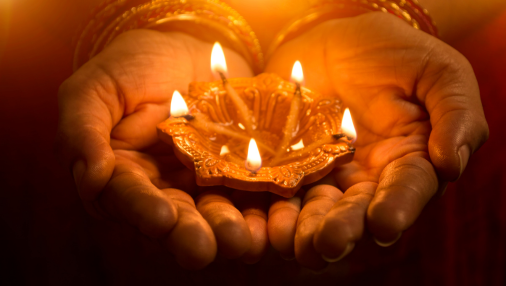The Real Meaning of Diwali: Beyond Lights and Festivities
Introduction: Diwali, often called the "Festival of Lights," is one of the most celebrated festivals in India and across the world where Indian communities reside. Streets glow with lamps, houses sparkle with decorations, and families come together to celebrate the triumph of light over darkness. However, beyond the rituals, sweets, and fireworks, Diwali carries a deeper spiritual and cultural significance. To truly understand Diwali, one must explore not only its historical background but also its symbolic meaning and the lessons it offers in today’s world.
Historical Origins of Diwali
The real meaning of Diwali finds its roots in Indian mythology and cultural traditions. In Northern India, it is associated with the return of Lord Rama to Ayodhya after a 14-year exile and his victory over the demon king Ravana. The people of Ayodhya lit oil lamps (diyas) to celebrate his return, symbolizing joy and the restoration of dharma.
In Southern India, Diwali is linked with Lord Krishna’s victory over the demon Narakasura, signifying the triumph of good over evil. In Western India, it marks the day Lord Vishnu sent the demon king Bali to rule the netherworld. For Sikhs, it commemorates the release of Guru Hargobind Ji from prison. For Jains, it celebrates the nirvana of Lord Mahavira. These diverse stories all carry the same message—freedom, righteousness, and spiritual enlightenment.
Spiritual Significance of Diwali
While lights, crackers, and sweets are visible aspects of Diwali, its spiritual meaning runs deeper. The lamps symbolize the light of wisdom that dispels the darkness of ignorance. Diwali reminds us that external celebrations are incomplete without inner reflection. True Diwali is not just about decorating homes but also about cleansing the mind and heart.
Filling life with positivity, choosing truth over falsehood, and spreading kindness are the real lamps we must light. Each diya lit during Diwali reflects hope, compassion, and the victory of virtue within us.
Diwali as a Celebration of New Beginnings
Another real meaning of Diwali is renewal and fresh starts. It marks the Hindu New Year in several regions of India, symbolizing prosperity, wealth, and success. Business communities open new accounting books, families buy new clothes, and households clean every corner of their homes to invite good fortune.
But more than physical renewal, Diwali teaches us about inner renewal. Letting go of grudges, forgiving others, and starting afresh with a clean heart is as important as decorating the house with lights. The festival encourages self-growth, discipline, and new opportunities.
Diwali and the Value of Relationships
One of the most profound aspects of Diwali is the coming together of families and communities. In today’s fast-paced world, where people are often consumed by work and digital distractions, Diwali reminds us of the value of relationships. Exchanging sweets, visiting relatives, and performing rituals together build bonds of trust and love.
The real meaning of Diwali lies not just in lighting lamps but in lighting hearts with joy. It inspires us to be generous, to share our happiness, and to uplift those who may be struggling. Charity and giving are essential aspects of the festival, as they spread the true light of humanity.
The Economic and Social Aspect
Diwali is also a symbol of prosperity. It is one of the biggest shopping festivals in India, with people purchasing clothes, gold, utensils, electronics, and gifts. Markets and e-commerce platforms witness record sales, boosting the economy. For small businesses, craftsmen, and artisans, Diwali provides an opportunity to showcase their art and earn their livelihood.
This economic vibrancy is important, but the real meaning of prosperity goes beyond material wealth. Prosperity also means health, happiness, peace of mind, and a balanced life. Diwali teaches us to pursue prosperity that nurtures both the outer world and the inner self.
Diwali and the Environment
In recent years, Diwali celebrations have raised concerns about pollution due to firecrackers and excessive waste. The real meaning of Diwali, however, is not in noise and smoke but in harmony with nature. Eco-friendly Diwali celebrations are becoming more popular, with people choosing clay lamps, natural decorations, and reduced fireworks.
When we celebrate Diwali in a way that respects the environment, we honor the true spirit of the festival—light, purity, and balance. The festival encourages us to take responsibility for the world around us while celebrating life’s joys.
Lessons for Today’s World
- Light over darkness – Choosing hope instead of despair.
- Good over evil – Making ethical choices in personal and professional life.
- Knowledge over ignorance – Seeking truth, learning, and awareness.
- Unity over separation – Building communities and valuing relationships.
- Renewal over stagnation – Welcoming change and growth in every aspect of life.
Conclusion
The real meaning of Diwali goes far beyond candles, crackers, or sweets. It is a festival that reminds us of life’s deeper truths—righteousness, renewal, relationships, and responsibility. Diwali urges us to light not just our homes, but also our hearts and minds. By celebrating it with awareness, generosity, and respect for nature, we can keep its true spirit alive.
So, this Diwali, while the lights glow outside, let us ensure that the true light of love, wisdom, and kindness glows inside us. That is the real Diwali.

